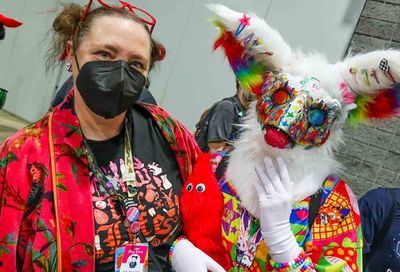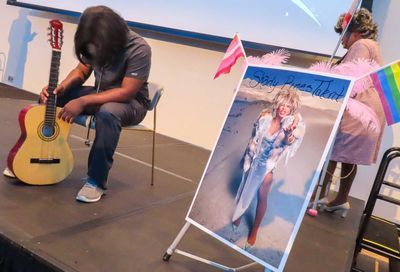Dr. Ruth: An interview with the ‘Goddess of Good Sex’
Dr. Ruth still wants everybody to have great sex, and to go see her new documentary "Ask Dr. Ruth"

Doctor, author, wife, mother, Holocaust survivor, army sniper, pop culture phenomenon, the so-called Goddess of Good Sex — Dr. Ruth K. Westheimer has witnessed, learned, and experienced enough to fill volumes of page-turning biographies.
The incredible life story of the sex therapist, born Karola Ruth Siegel to Orthodox Jewish parents in Karlstadt, Germany, already has inspired Mark St. Germain’s acclaimed stage play Becoming Dr. Ruth. Now, a new documentary film, Ask Dr. Ruth, directed and produced by Ryan White, presents the good doctor on camera amid a treasure trove of interviews and archival footage to relay Karola Siegel’s amazing journey, from escaping Nazi Germany as a child to the peak of her success as America’s favorite sex therapist.
Both the play and the documentary capture Dr. Ruth’s remarkable history and influence, but the film works best at demonstrating why she still commands attention today. After decades of blazing a trail for talking openly and knowledgeably about sex and sexuality, Dr. Ruth still keeps it real, advocating on behalf of Planned Parenthood and keeping abortion legal.
In the film, as she does in person, Dr. Ruth delivers her messages firmly, always projecting her famous joie de vivre and indomitable strength. Both qualities are fully in evidence from the moment the spry 90-year old enters the room alongside Ask Dr. Ruth director White, who also directed the docs Serena and The Case Against 8.
Eagerly touting her new children’s book celebrating diversity, Crocodile, You’re Beautiful, Dr. Ruth is on a mission to speak her wisdom to audiences of every generation, and not just about sex. The voluble therapist also whips out Roller-Coaster Grandma, the 2014 young adult graphic novel tracing some of the darker chapters of her life. “One of the reasons I did that book, and that I did the book about diversity, is that out in the world, there is a tremendous amount of antisemitism these days,” she says. “I have to stand up and say — for those people who deny the Holocaust, who say it never happened — ‘Stop.’
“And as long as I’m still around, I have to stand up to be counted, that it did happen. I want to be able to tell every journalist that they have to stand up to be counted against prejudice, and we have to start that with small children.”
METRO WEEKLY: In regards to LGBTQ acceptance, a motto that you expressed in the movie that I agree with wholeheartedly is, “Respect is not debatable.”
RUTH: Not debatable.
MW: Growing up did you have any gay friends?
RUTH: No, I didn’t know about that aspect of life, not in the children’s home that became an orphanage, not in the kibbutz where I stayed. I did not know about gay people.
RYAN WHITE: Didn’t you fall in love with a gay guy?
RUTH: No, he fell in love with me.
MW: I would think that gay men would have been flocking to you.
WHITE: You told me that in a separate documentary. I interviewed her for a separate LGBT series. I thought you fell for a guy, then you realized he was very gay.
RUTH: Walter, I know his name, he’s not alive anymore.
WHITE: We don’t need to out him seventy years later.
RUTH: It’s not that Walter. Another Walter.
WHITE: Different Walter.
RUTH: I have to tell you, there was one guy who also was on a Kindertransport, in a group of children coming from Germany. He was older, so he was in a different group but I have known him a long, long time. I don’t remember if I knew him from Switzerland, or maybe then Israel, or maybe then in New York. I know now that he was absolutely not interested in women, but he wanted to marry me.
In those years gay people did want to get married in order to have a cover. And then they did whatever they did, maybe with men, maybe not with men, maybe with women, but in those days nobody was willing to say, “This is my husband,” or like last night, women saying to me, “This is my wife.” Now it rolls off my tongue easy. It took a while to get that language going.
WHITE: You also, she did something really cool which is not in the film, where you trained under that expert in gay sex in New York, because you didn’t know enough about gay sex.
RUTH: Charles Silverstein was running a therapy session. Not session, an institute, called Institute for Human Identity. And I worked with him, I volunteered, I think maybe two years, at the center where I went once a week to do therapy, and that’s the first time that I really realized that the problems between gay people are not different than other people. Even sexually speaking. And then, in those years, lesbians did not come to the clinic. But there was one, and she was a superb social worker and a lesbian, so [Charles] said I should work with her to learn about the gay culture, and I did and for a while we were very good friends. So I went I think once a week to that Institute for Human Identity. Charles Silverstein is the one who wrote the book The Joy of Gay Sex.
WHITE: Great book.
RUTH: [And] maybe another one, The New Joy of Gay Sex.
MW: Speaking of sequels, you said that you were publishing a new edition of your book Sex for Dummies. So what’s changed, what’s updated?
RUTH: I tell you what the changes are. It’s coming out in August, and it’s particularly changed in terms of the language for young people. There’s also a chapter in there about what has changed in the gay community, and I had two friends who are married and gay, Raul and Michael, read that chapter and see if they wanted to make any changes, if there’s anything new. Raul is the chair of the [Spanish] department at Montclair.
The book has two reasons. One is the millennials don’t know me because it’s a long time ago that I did the radio, so I want to talk to the millennials. And the other reason is that I’m very concerned about loneliness, not only with young people but also with older people, and I’m very concerned about those people who engage in one night stands, and about a new rise of sexually transmitted disease.
MW: Is that your main concern regarding casual sex?
RUTH: I’m not saying the main concern. My main concern is to educate, but under that heading I would say that the loneliness is an issue, and the sexually transmitted disease is an issue because you don’t have to worry so much anymore, there’s medication. So I’m concerned about that for all ages but particularly the young ones.
And then there’s something that has nothing to do with sex. I’m very concerned about the art of conversation being lost. Everybody’s sitting with their [cell phone].
MW: Did you feel stalked by the camera crew?
RUTH: No. I tell you what I did feel, I had to watch out for Ryan very carefully because he’s very sneaky. So I watched out, but I’m very happy.
WHITE: There was a no bedroom rule. Remember, you would never let me back in that hallway?
RUTH: The first sentence out of my mouth in the film is, “Close the bedroom door, I don’t want Ryan in the bedroom.”
WHITE: You let me in after we stopped filming. She finally let me see her bedroom. Which was like Narnia.
RUTH: I learned yesterday, which I did not know, that Ryan had to be convinced by me to make the documentary. I did not know that.
WHITE: Power of persuasion.
RUTH: One of the reasons that I convinced him to make a documentary —
WHITE: You didn’t convince me.
RUTH: You said that when you met me you thought, “Oh my gosh, I’m gonna do that thing with this old lady?” But then you met me and you agreed yes.
WHITE: That’s not true. No, I didn’t have the time to be making a documentary. And then I met you. I wasn’t supposed to be making another feature film, I already had two feature films in production. But I wanted to meet you and at least have dinner with you, and then at the dinner, I fell in love and then decided that I had to do it.
RUTH: Wait, Ryan’s significant other, his partner David — I don’t want him to hear that Ryan fell in love with me.
MW: I think he’ll learn that from watching the movie.
RUTH: Wait, because I know David and I like him. So careful with your words.
Ask Dr. Ruth is not rated, and opens May 3 at Landmark’s Bethesda Row Cinemas. Visit www.landmarktheatres.com/washington-d-c.
Support Metro Weekly’s Journalism
These are challenging times for news organizations. And yet it’s crucial we stay active and provide vital resources and information to both our local readers and the world. So won’t you please take a moment and consider supporting Metro Weekly with a membership? For as little as $5 a month, you can help ensure Metro Weekly magazine and MetroWeekly.com remain free, viable resources as we provide the best, most diverse, culturally-resonant LGBTQ coverage in both the D.C. region and around the world. Memberships come with exclusive perks and discounts, your own personal digital delivery of each week’s magazine (and an archive), access to our Member's Lounge when it launches this fall, and exclusive members-only items like Metro Weekly Membership Mugs and Tote Bags! Check out all our membership levels here and please join us today!























You must be logged in to post a comment.